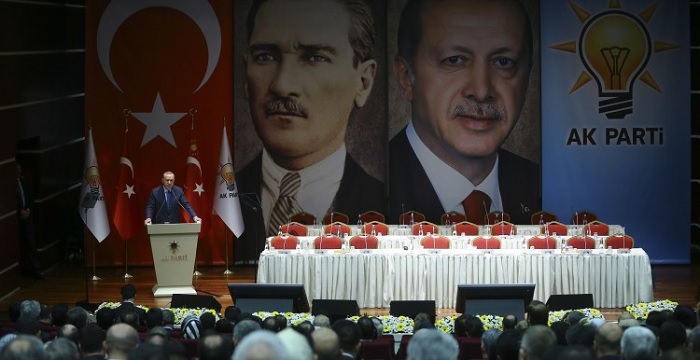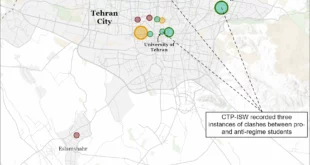
Turkish President Recep Tayyip Erdogan’s online address to students on June 26 was the latest sign that his efforts to shape Turkey’s young generation in his image have failed. Thousands of students joining the YouTube livestream disliked the video and used the comments section to criticize Erdogan and tell him that he wouldn’t get their vote.
They were justifiably frustrated that the government had shifted the date of this year’s university entrance exam back and forth several times over the past few months, a result of poor pandemic-related planning. But in the days that followed, the students’ frustration turned into general anger at Erdogan. The video has received 422,000 dislikes and the hashtag #OyMoyYok—no votes for you—became a trending topic on Turkish Twitter. Not only did Erdogan’s office disable the video’s comments, but shortly afterward, Erdogan announced plans for new regulations to control social-media platforms or shut them down entirely.
The students were frustrated at the government’s handling of this year’s university entrance exam—but in the days that followed, their frustration turned into general anger at Erdogan.A whole generation of Turkish youth has now grown up under Erdogan—first as prime minister, then as president. With half of the country’s population below the age of 32, what young people think has significant political ramifications. No one seems to know this better than Erdogan: Beginning in 2012, he embarked on a project to raise “pious generations.” His main tool to accomplish this has been the country’s education system, including by pouring billions of dollars into religious education. He dramatically increased the number of imam hatip secondary schools, which were originally founded by the state as vocational institutions to train young men to become imams and preachers, and extended this system to lower age groups. At regular public schools, he increased the number of hours dedicated to religious education and banned the teaching of evolution from the curriculum.
But religious schools are underperforming and have little appeal among Turkish youth. A recent poll found that religiosity is much lower in the younger generation, with far fewer describing themselves as “religiously conservative” than society as a whole. Growing numbers of young people—even students at imam hatip schools—are rejecting Islam altogether. A 2018 workshop organized by the Ministry of National Education in the traditionally conservative Anatolian town of Konya found that students in imam hatip schools are questioning or abandoning Islam in growing numbers. Many now consider themselves deists—people who believe in a divine being but don’t adhere to the tenets of Islam. Pro-Erdogan media portray deism as just another Western conspiracy, but for young people, disillusionment with religion and the government goes hand in hand. Under Erdogan, his critics say, Islam has been stripped of its moral core and instrumentalized to cover up corruption and legitimize his one-man rule. This pushes young people to search for other sources of moral authority.
Young people’s rejection of Erdogan’s brand of Islamic conservatism also has to do with the poor quality of education as religion displaces standard subjects. Even conservative parents worry that the heavy dose of religious instruction in secondary schools prevents their children from learning enough math, science, and technology to successfully compete in university exams.
Young people’s rejection of Erdogan’s brand of Islamic conservatism also has to do with the poor quality of education as religion displaces standard subjects.Growing concern about the quality of education is about more than religion, however. It also has to do with Erdogan’s increasing interference in the university system. Following the introduction of the presidential system in 2018, Erdogan now has the sole authority to appoint the heads of all public and private universities. Many of these have been political loyalists with poor academic qualifications.
The quality of education has become one of the top worries among young Turks, many of whom believe that they can only get a good education in a Western country. Even as the share of high school graduates going on to higher education has increased, young people doubt that their degree will land them a decent job. (Youth unemployment hit a record 27 percent last year.) Compounding their worries is the spread of nepotism under Erdogan. A large majority of Turks now believe that it isn’t what you know but who you know that will land you a job. Even those who support Erdogan complain about the lack of merit-based hiring in both the public and private sectors.
Feeding the youth revolt against Erdogan is the worry about increasing authoritarianism and the curtailment of freedoms. According to a 2018 poll, a large majority values freedom of expression, and young Turks are more tolerant toward different ethnic and religious groups and toward homosexuality than a similar age group polled 10 years previously. The number of respondents who said political parties can be banned if necessary has also declined significantly in the past few years. An overwhelming majority of the new generation that has grown up under Erdogan wants to move abroad in search of freedom and opportunity.
If Erdogan has largely failed to mold the new generation to support him, his efforts were not wasted entirely. Since 2015, he has built his electoral strategy on an anti-Kurdish platform, undoing his previous efforts at reconciliation with Turkey’s largest ethnic and linguistic minority. Erdogan has criminalized the Kurdish opposition, thrown the democratically elected members of the pro-Kurdish Peoples’ Democratic Party in jail, and replaced the party’s mayors with Erdogan-appointed trustees. At the same time, he has promoted an increasingly anti-Western Turkish nationalism that seeks to expand Turkish power in the region. Nationalist and anti-Kurdish sentiment has found strong support among both secular and conservative youth, making them less tolerant toward the Kurds’ demands for equality. Kurdish youth holds similarly skeptical attitudes vis-à-vis ethnic Turks. Kurds say they avoid talking about politics with their Turkish friends, and the number of intermarriages has declined.
They have watched him morph from a dynamic leader to an exhausted autocrat struggling to govern.Erdogan’s nationalism has also turned to “civilization” rhetoric, particularly since 2012. The country’s Muslim roots and imperial Ottoman past are often glorified. These efforts seem to have paid off: Many young people now identify themselves as part of the Middle East, unlike previous generations under more secular, Western-oriented governments. But their hopes and aspirations tell a different story. They want to get a secular education and live in a modern, free, and democratic country. They prefer living in Europe over the Middle East. More than 70 percent of young people said they would prefer to live in Switzerland than Saudi Arabia, even if it meant making do with a monthly salary of $5,000 instead of $10,000.
Turkey’s youths have known nothing but Erdogan’s leadership. They have watched him morph from a dynamic leader building a more democratic, prosperous, and Western-oriented Turkey to an exhausted autocrat struggling to govern. Changing the date of the university entrance exam, on which so much in a young person’s life depends, was just the latest indication that Erdogan was failing them. As they now say “no votes for you,” Erdogan has not only failed to raise a generation of supporters, but may have raised the generation that will finally defeat him.
 Eurasia Press & News
Eurasia Press & News



